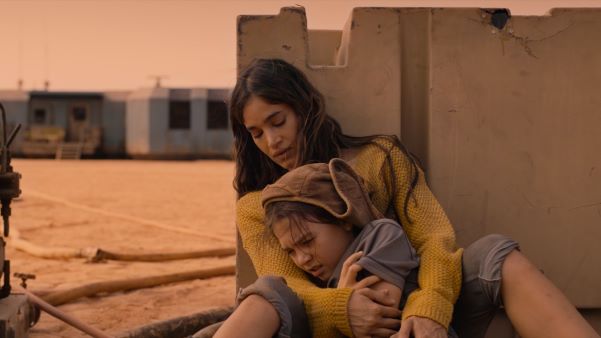
Space migration in sci-fi cinema tends to go one of two ways: a daunting but opportunistic fresh start on life or a gritty battle for survival. Wyatt Rockefeller’s Settlers aims more for the latter, but in a perverse twist, links its setting—a roomy space station-like household and animal farm set up on a crater-sized patch of land on Mars—to the former. This land might be the only habitable part of the world left. (There are references to Earth’s depleted sustainability, a bygone war on Mars’s surface, and an atmosphere dwindling by the day.) Staying on this land ensures survival, no matter the costs.
It’s here that Ilsa (Sofia Boutella), Reza (Jonny Lee Miller), and their daughter, Remmy (Brooklynn Prince), call home. They live as normal an isolated life as possible, raising pigs and chickens in a nearby pen and looking at the stars from inside the dwelling. Remmy’s parents, both formally of Earth, tell her they left that planet “because we wanted something more,” though it’s later implied that they haven’t made a down payment. Masked raiders occasionally show up on their land, and at one point the word “LEAVE” is painted on a window in what looks like blood, yet Ilsa insists they must defend their home. Both parents are proficient enough in firearms to suggest that such intrusions have happened more than once. However, things become problematic when a stranger, Jerry (Ismael Cruz Córdova), shows up and makes himself a guest, claiming the house once belonged to his parents.
Jerry, for all intents and purposes, tries to set himself up as the new man of the house. He’s got guns and some mechanical skills, so for survival’s sake, Ilsa keeps him on board. This doesn’t sit well with Remmy. Yet upon trying to run away, Remmy comes face to face with obstacles that clarify just how she and her family were able to survive on Mars for so long and why their land holds such value. For all we know, Jerry’s claims that the old Mars society is gone might be true. A massive door beyond her home may hold answers to everyone’s fears, but getting through it will require resources and experience that she doesn’t have quite yet.
If one could describe what happens in Settlers, the answer is both “a lot” and “not much.” Rockefeller primarily focuses on Remmy’s day-to-day activities and how every adult character tries to raise her in this lone environment. Yet the film’s production design and iconography paint such a life as claustrophobic in spite of the girl’s occasional curiosity and Jerry’s presence. An ominous red glow shines through the cabin at night like a searchlight, at one point forcing Ilsa to take her kid to the bathroom by avoiding every window in fear of who’s watching from the outside. The red-dusted landmass where Remmy tends to animals is as much a playground as it is a prison.
In retrospect, Remmy’s arc feels more complete than her adult counterparts. Boutella and Córdova are still strong, but their characters tend to produce outcomes that influence the child’s outlook more than their own growth. Prince plays Remmy as caring and aggrieved, forced to navigate routines that once brought comfort but now warrant concern for what the future may bring. It’s not so much The Martian as it is 10 Cloverfield Lane, albeit with the climax feeling more predictable than Settler’s previous two acts.
Small as the characters’ interactions feel, Settlers’ geographical remoteness always loop them back to an ongoing sense of isolation. Rockefeller makes the thrill of space secondary to implications that humanity’s new frontier is nearly gone. As a result, the Rod Serling–inspired flow and the visual grittiness help make this narrative nerve-wracking. The substance is there, but the style is what makes it all feel deeply alien.
















Leave A Comment